 Petzlover
Petzlover Serbian Tricolour Hound is originated from Croatia but Spanish Mastiff is originated from Spain. Serbian Tricolour Hound may grow 33 cm / 12 inches shorter than Spanish Mastiff. Serbian Tricolour Hound may weigh 75 kg / 165 pounds lesser than Spanish Mastiff. Serbian Tricolour Hound may live 3 years more than Spanish Mastiff. Serbian Tricolour Hound may have less litter size than Spanish Mastiff. Both Serbian Tricolour Hound and Spanish Mastiff requires Low Maintenance.
Serbian Tricolour Hound is originated from Croatia but Spanish Mastiff is originated from Spain. Serbian Tricolour Hound may grow 33 cm / 12 inches shorter than Spanish Mastiff. Serbian Tricolour Hound may weigh 75 kg / 165 pounds lesser than Spanish Mastiff. Serbian Tricolour Hound may live 3 years more than Spanish Mastiff. Serbian Tricolour Hound may have less litter size than Spanish Mastiff. Both Serbian Tricolour Hound and Spanish Mastiff requires Low Maintenance.
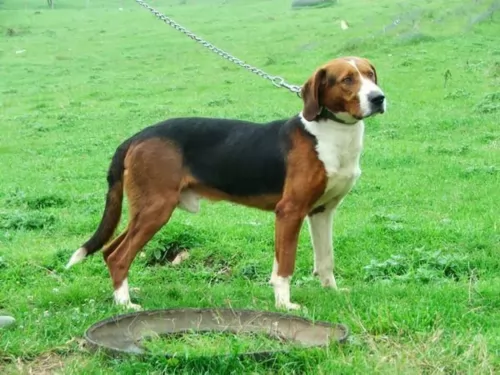 The Serbian Tricolour Hound was once known as the Yugoslavian Tricolour Hound. It’s a rare dog breed that you won’t find much outside of the Balkans.
The Serbian Tricolour Hound was once known as the Yugoslavian Tricolour Hound. It’s a rare dog breed that you won’t find much outside of the Balkans.
These dogs were bred for hunting in packs but in these more modern times they are more of a companion dog.
It is thought that the Serbian Tricolour Hound was a variant of the Serbian Hound until 1946 when a separate breed standard was established. It was recognized by the Federation Cynologique Internationale in 1961.
 The Spanish Mastiff is a giant breed that comes from Spain. He has always been a guardian dog.
The Spanish Mastiff is a giant breed that comes from Spain. He has always been a guardian dog.
He is an ancient dog breed, in fact dating back to medieval times. He has always been a guardian of livestock, protecting them from attacks from wolves and other predators.
The first breed standard of this pure breed dog was made by the FCI in 1946. A breeding program was also formed for this dog In 1981.
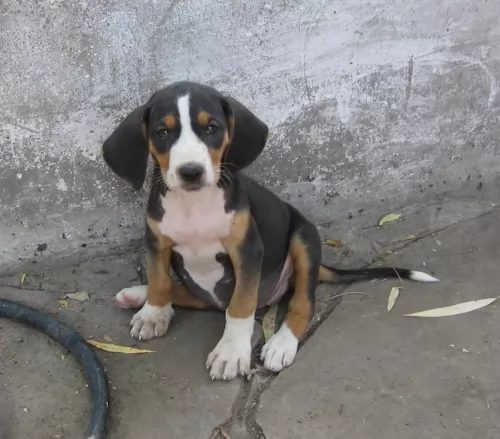 The Serbian Tricolour Hound is a medium sized dog standing at between 44 to 55cm in height and weighing in the region of 20 to 25kg.
The Serbian Tricolour Hound is a medium sized dog standing at between 44 to 55cm in height and weighing in the region of 20 to 25kg.
He is a strong, muscular, solidly built dog with a rounded skull and longish muzzle. The ears of this dog are long and floppy and the long, curved tail hangs down but is held high when the dog is excited.The dog has a short, glossy coat which is essentially a rusty color. There is quite a lot of black with some white on the coat too.
Loving and loyal, this dog was once used for hunting and he has learned to listen carefully to- and respond well to his owner.
He loves his human family and makes a great family pet. He gets on well with the kids, loving to take part in their games. He is intelligent and with training and socialization he is obedient, well balanced and well mannered.
Friendly and social, all he wants is to be with his human family, but even so he is better suited to life with a family who lives on a large property in the suburbs or countryside as opposed to living in the city.
 The Spanish Mastiff weighs between 52 and 100kg and the dog’s height is between 72 and 88cm. He has a thick, heavy coat with rustic colors of fawn, black, grey, reddish and yellow as well as brindle.
The Spanish Mastiff weighs between 52 and 100kg and the dog’s height is between 72 and 88cm. He has a thick, heavy coat with rustic colors of fawn, black, grey, reddish and yellow as well as brindle.
He is powerful and muscular with a huge head. The ears are medium length and floppy and the tail is long. If you were looking for a puppy, the American Kennel Club is the only site which has 100% puppies from AKC-Registered litters.
Large, kind, gentle and intelligent, the Spanish Mastiff is well balanced. When you see him you won’t find a dog that is light on his feet and who jumps around excitedly. He is a dignified, intelligent dog, quiet and calm.
Even though he is so calm, it is still a good idea to have him trained and socialized as his very size could be a problem. When you tell him to lie down, you want him to listen to you. This big, gentle giant is devoted to his human family ad takes the role of guardian and protector seriously.
He isn’t suited to life in the city but is better suited to a large property, also because he has a loud bark.
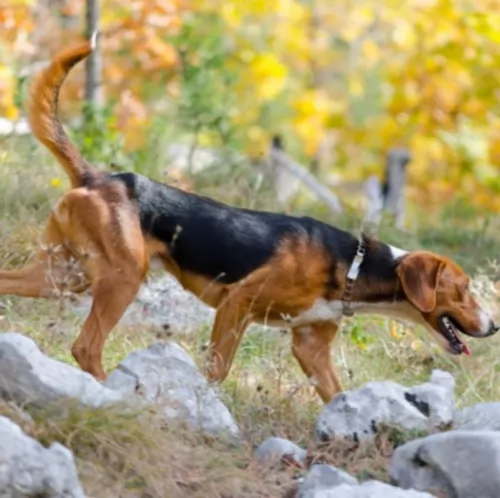 The Serbian Tricolour Hound is a loving, loyal, active, devoted breed that loves his human family, wanting to be involved in all the activities they’re involved in.
The Serbian Tricolour Hound is a loving, loyal, active, devoted breed that loves his human family, wanting to be involved in all the activities they’re involved in.
He is somewhat reserved with strangers but training and socialization helps to make him well behaved around them and it means you can take him with you wherever you go as he is well behaved.
These Serbian dogs make splendid pets, and if you take good care of yours, he will provide you with unconditional love.
 Kind, gentle, quietly confident and intelligent are just some of the wonderful characteristics of the Spanish Mastiff.
Kind, gentle, quietly confident and intelligent are just some of the wonderful characteristics of the Spanish Mastiff.
You can add loyalty and devotion to these characteristics too and the fact that he wants to protect you.
Your gentle giant is guaranteed to make you the most wonderful companion and he deserves the very best treatment there is.
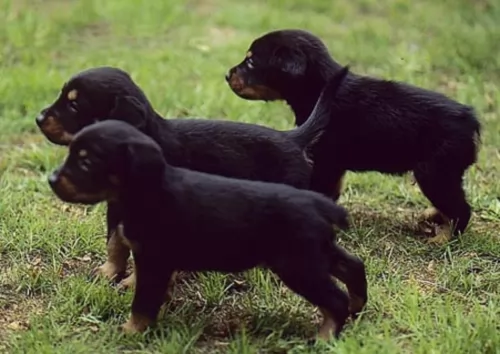 The Serbian Tricolour Hound is such a healthy dog breed and with the right nutrition and exercise can reach 12 to 15 years of age. He is a rare dog breed so there isn’t a whole lot of information available about his health.
The Serbian Tricolour Hound is such a healthy dog breed and with the right nutrition and exercise can reach 12 to 15 years of age. He is a rare dog breed so there isn’t a whole lot of information available about his health.
There are always going to be those common dog illnesses that many dogs succumb to. Some of them are hip dysplasia, cancer, skin problems and parasites.
With his floppy ears, check out the insides of his ears to ensure there are no signs of redness and ear discharge.
Hip dysplasia is a condition where parts of the hip joints don’t fit properly together. This creates a situation where there is abnormal wear and tear on the joints. It can lead to arthritis even and pain for your dog.
The tapeworm is a parasite spread to dogs but also to people and it is through the ingestion of infected fleas. You can often detect this when you discover parts of the worm crawling in your dog’s bowel movements.
Check your dog over for ticks and fleas too when you brush him as these can lead to other illnesses such as tick bite fever.
 It is good to be wise about some of the common dog problems there are that could plague your Spanish Mastiff. Vets are very familiar with these dog illnesses and they tailor their treatment to suit the needs of your dog.
It is good to be wise about some of the common dog problems there are that could plague your Spanish Mastiff. Vets are very familiar with these dog illnesses and they tailor their treatment to suit the needs of your dog.
Remember to get your pet vaccinated against the terrible diseases you get that can kill a dog – rabies, parvo and distemper.
People often think that obesity is something that isn’t dangerous, when in fact it is a serious disease that can cause joint problems, digestive disorders, heart disease, back pain and hip dysplasia.
Dogs rely on water just like what humans do to keep them healthy and functioning properly.
Water is critically important to every organ and also assists with digestion. Your dog is panting and urinating throughout the day and needs to replace the liquid he loses.
Dehydration in dogs results in loss of electrolytes, such as sodium, chloride, and potassium.This is bad as these minerals have important functions.
A dog that is dehydrated has loss of appetite, loss of skin elasticity, is lethargic, has sunken eyes, wants to vomit, has a dry nose and thick saliva. No dog should ever be left without a constant supply of fresh, cool water day and night.
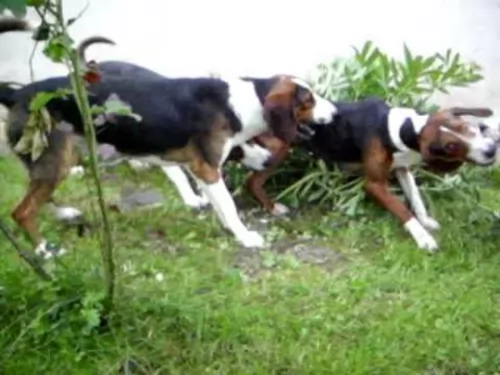 The short, shiny coat of the Serbian Tricolor Hound will require nothing more than a good brush twice a week to keep the coat nice and smooth. You can even take a damp cloth and wipe the coat over with it to remove dust.
The short, shiny coat of the Serbian Tricolor Hound will require nothing more than a good brush twice a week to keep the coat nice and smooth. You can even take a damp cloth and wipe the coat over with it to remove dust.
Provide your dog with a regular amount of exercise every day. Dogs become sad and unhealthy when they’re just stuck in the back yard and left on their own. Take him for walks each day and throw a ball for him to fetch. Simple little games like this will keep him happy as he loves to spend time with you.
Only the very best food is good enough for a dog. Dry kibble is excellent and convenient but try and feed your dog some home-made food too. Avoid spicy, exotic foods as this can upset your dog’s digestive system. Speak to your vet if you’re unsure how to feed your dog to ensure his good health and longevity.
 These are giant breed dogs, so you have to be careful with the way you feed them. Large dogs like these are prone to hip dysplasia so you need to choose a food which has ingredients that work to prevent this disease.
These are giant breed dogs, so you have to be careful with the way you feed them. Large dogs like these are prone to hip dysplasia so you need to choose a food which has ingredients that work to prevent this disease.
You have to be very careful that you don’t overfeed your dog so that the extra weight puts strain on the joints.
This dog will do well with some raw meat added into his diet. Also, include home-made food too. Boiled chicken, brown rice or pasta, sweet potatoes, carrots and spinach chopped up and added to his dry kibble for giant breeds. Added in twice a week can do him the world of good.
A good bush of the thick coat twice a week will keep the Spanish Mastiff looking his best.
The nails will also need to be trimmed regularly to avoid overgrowth and to avoid the nails catching onto things. The ears too should be checked regularly to avoid dampness inside the ear which can cause bacteria.
As a fully grown adult, the Spanish Mastiff isn’t a frisky, frolicking dog but he will still require daily exercise. Options for exercise include long walks, hikes, swimming and ball games.